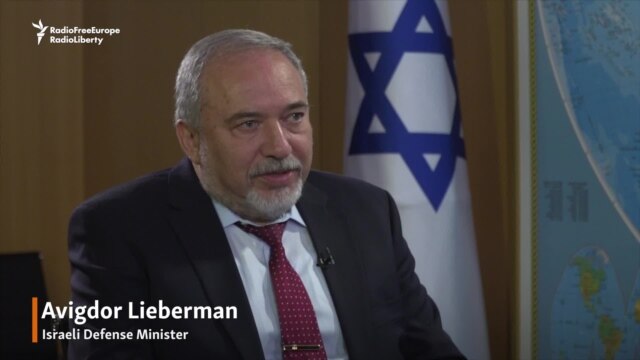Radio Farda Interview With Israeli Defense Minister Sets Precedent
Earlier this month, Radio Free Europe/Radio Liberty’s (RFE/RL) Mehrdad Mirdamadi, a reporter with Radio Farda, RFE/RL’s Persian language service, sat down with Israeli Defense Minister Avigdor Lieberman in Tel Aviv for an unprecedented interview.

Earlier this month, Radio Free Europe/Radio Liberty’s (RFE/RL) Mehrdad Mirdamadi, a reporter with Radio Farda, RFE/RL’s Persian language service, sat down with Israeli Defense Minister Avigdor Lieberman in Tel Aviv for an unprecedented interview. It was the first time an Iranian journalist had interviewed a sitting Israeli defense minister at the ministry’s headquarters, and in a country with intense government media censorship, a rare chance for Iranian audiences to hear the first-hand perspective of an Israeli politician. RFE/RL Pressroom spoke with Radio Farda Editor in Chief Niusha Boghrati about the reaction to the interview inside Iran and its impact.
RFE/RL Pressroom: Radio Farda’s interview with Lieberman covered a lot of ground. What were the most important questions for your audiences in Iran?
Niusha Boghrati: First of all, just the fact that the interview took place is by itself very important for Iranians because there is a lot of disinformation in Iran, especially regarding Israeli politicians like Lieberman, so to hear from him first hand is very important.
RFE/RL Pressroom: He spoke at length about Syria…
Boghrati: Iranian people are quite anxious about what will happen in Syria. We have seen clashes between Israeli-backed and Iranian-backed forces there. The Israeli military has targeted locations in Syria used by Iran to mobilize its forces. Lieberman explained that Israel is not against Iran’s economic or political cooperation with Syria, but he made it clear Israel will not tolerate any Iranian military presence in Syria. This statement was key, because Iranian state media portrays the Israeli position as being against any involvement by Iran in Syria. Like [Israeli Prime Minister Benjamin] Netanyahu, Lieberman makes a distinction between Iranian people and the Iranian regime, which is also important for Iranians to hear.
Finally, Lieberman described the warming of relations between Israel and Arab countries in the region as resulting in large part from Iran’s aggressive remarks and provocative acts, which have helped Israel draw support from Arab countries that otherwise would not be on the same page as Israel. This is an important shift in policy that Iranians will not learn about from state media.
RFE/RL Pressroom: How did people in Iran react to the interview?
Boghrati: It was very popular. Mostly, I think, because it was completely unprecedented. In terms of the feedback, you know, Iranian society is incredibly polarized on the issue of Israel. There is a very vivid division in public opinion with no gray area. Some hard-core Iranian opposition activists believe the fiery stance of Israeli politicians like Lieberman can lead to the toppling of the Iranian regime, so they see these figures as enemies of the regime, and hence, friends of the Iranian people. On the other hand, some people view politicians like Netanyahu and Lieberman as a security and military threat to Iran, and this perceived threat boosts nationalist feelings. These people view such politicians as enemies of the nation.
RFE/RL Pressroom: How does interviewing an outspoken Israeli politician like Lieberman for Iranian audiences reflect Radio Farda’s mission?
Boghrati: Interviewing not just Lieberman, but any person whose voice is cut off from the information space in Iran is the definition of RFE/RL, and hence, Radio Farda. Foreign politicians are censored and their comments are manipulated by Iranian state media, so the people of Iran don’t have access – from internal official sources – to information on policymakers and the stances of people who will make decisions that impact lives of Iranians. It’s our job as independent journalists to describe events truthfully and accurately, and to do that we have to go straight to the source to find out what the strategies of policymakers are, especially when the stakes are so high.
—Emily Thompson
RFE/RL’s Radio Farda breaks through government censorship to deliver accurate news and provide a platform for informed discussion and debate to audiences in Iran.
Subscribe to a weekly update of news, features, and analysis on Iran here.